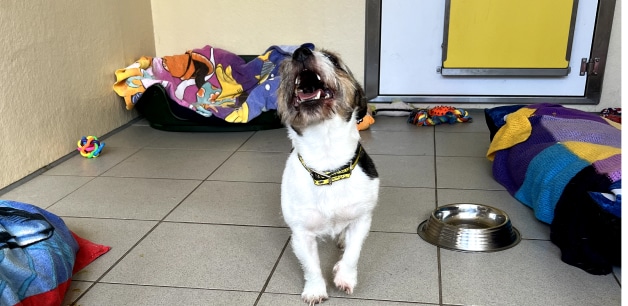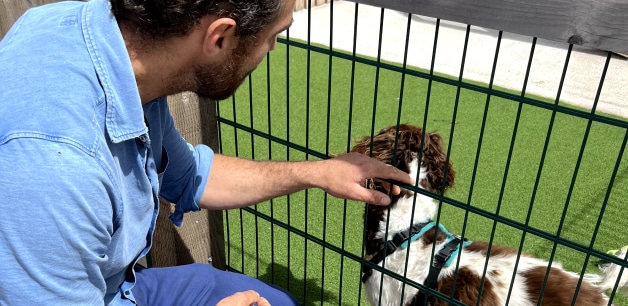Giving dogs a second chance
Have you ever thought about welcoming a rescue dog into your home? Rescuing a dog could be the most challenging, yet rewarding experience you ever do. It’s a selfless act that can not only literally change a dogs’ life – but yours, too!
Unfortunately, it’s estimated that 130,000 dogs enter UK shelters every year. As an advocate for the happiness and wellbeing of dogs, I feel strongly about supporting the vital work that rescue centres do. Right now, it’s more important than ever.

How the COVID-19 pandemic affected animal rescue shelters
When the first lockdown of COVID-19 struck, rescue centres saw a surge in demand for dogs. It’s no wonder! More time with the family and working from home seems like the perfect time to bring a new pet into your family home. Extremely long waitlists for rescue dogs meant many families opted to purchase puppies instead. This caused what is now referred to as the lockdown puppy boom.
Now in post-COVID times, a huge number of puppies and dogs bought during lockdown have ended up in shelters. This aligned with workplaces reopening, so it can be assumed that some families sadly didn’t have the time to care for their new dogs. After the last lockdown was lifted, Dogs Trust saw a 39% increase in the number of enquiries about surrendering dogs. They also saw a 100% increase in the number of visits to their ‘Giving up your dog’ website page. This was the sad reality for thousands of lockdown pets post-COVID.
Nonetheless, important rescue shelters such as Dog’s Trust have always remained dedicated to the health and wellbeing of homeless pets, even throughout the pandemic. Their top priority is always to allow dogs the best possible chance of finding a forever home with a loving family.

Choosing the right rescue dog for you
One thing I’ve learned from speaking to people with rescue dogs, is that their dogs chose them, and not the other way around. Unlike selecting a puppy that ticks all of your boxes, finding the right rescue dog can be a more complicated process. That said, once the right dog chooses you, it’s worth the wait. Here are some factors you should consider in your search for your new companion.
Rescue dogs often come from troubled backgrounds
This means they could be nervous and unsettled in new environments, depending on their past experiences. For instance, a street dog who has never seen the inside of a loving home might take some time to become comfortable in their new surroundings. Whereas a rescue dog who was given up by their previous family, or has hopped from shelter to shelter, might adapt more quickly to their new home and family.
Some rescue shelters can have very strict rehoming regulations
Some shelters include rules such as no children, a mandatory garden space, or no shared living arrangements such as house shares. It’s really important to be clear about exactly what type of home and lifestyle you can offer a rescue dog. This will help the shelter to match you with your perfect four-legged friend.
Adopting a dog from overseas
Strict adoption regulations in the UK often mean that some families might find it difficult to rehome a rescue dog. Because of this, you could look to adopt from overseas instead. There are plenty of international rescue charities that are able to arrange UK homes for homeless dogs. However, it’s very important to ensure that you do lots of research to ensure that the charity is legitimate. Make sure you ask about how the dog came to the shelter, check the charity’s reviews and reputation, and inquire about their rehoming regulations.
Are you someone hoping to provide the best life for a dog in need? If so, it’s important to make sure that you find the right dog for you and your home.
How to prepare for bringing your rescue dog home
So, you’ve found a match and you’re ready to bring your new rescue dog home! I’ve seen firsthand, at many shelters, the joy of a family finding their perfect match. The next steps are incredibly exciting but also could be overwhelming.
It’s important to remember that your new rescue dog might not settle in straight away, and that’s okay! It could take a while for a rescue dog to adjust to their new environment and family, so it’s vital to give them enough time and space to settle in.
Firstly, make sure you’re prepared with everything you need such as:
Collar, harness, lead.
Food and water bowls.
A comfy bed, either in a crate or safe space just for them.
Some toys (bear in mind some rescues might not know how to play at first, but you can teach them and build their confidence!).
Food and training treats (for rescue dogs from overseas, it’s recommended to have boiled chicken and rice on hand to help ease their stomachs after a long journey).
Contact details for your local vet.
Secondly, before bringing your new rescue dog home for the first time, it’s important to ensure that you assess the safety of your home. This might include checking there are no areas of the garden where your dog could escape, or making sure all hazards are safely out of reach. Most UK shelters conduct their own home checks.
Once you’re happy that you’ve got everything you need and you’ve dog-proofed your home, then you’re ready to bring them to their new forever home.

The 3-3-3 rule
The day has finally come to introduce your new rescue dog to their forever home! Remember, you can’t expect them to adapt straight away. In my discussions with several shelters and rescue owners, I’ve learnt a really useful way of understanding the stages that a rescue dog will go through. It’s usually referred to as the 3-3-3 rule. By using this rule, you should know what to expect from your new rescue dog during the first three days, weeks and months of being in their new home.
First three days:
During the first three days, your new rescue dog might appear unsettled and nervous in their surroundings. They could be reluctant to eat and you might even notice them testing the boundaries with their behaviour. This is all normal for a new rescue dog, especially if they’ve come from a background of neglect. Giving them lots of space will allow them to come to you in their own time.
Additionally, rescue dogs are more likely to bolt or escape during the first week than any other period. Because of this, it’s recommended to keep them inside for at least a few days whilst they get to know you and their new surroundings. However, if you do decide to walk them during the first week, you could use a two-point contact lead which attaches to both the collar and harness. This can be used as an extra safety measure if your dog manages to slip their collar or harness.
First three weeks:
By week three of introducing your rescue dog into your home, you might notice they’ve started to settle into a comfortable routine! They could also start displaying some personality traits and similarly, some behavioural issues could arise as they become more confident.
During this period, it’s important to use lots of positive reinforcement. This will help your dog to understand what behaviours are and aren’t desirable. Never use negative reinforcement or punishments with rescue dogs, especially if they’ve come from a troubled background. Instead, any unwanted behaviour should be ignored, and good behaviour rewarded.
First three months:
By now, you and your rescue dog should have established a strong bond. They may have fully settled into their new home and routine, and behavioural patterns might be more consistent. You’ll also probably notice that their personality traits are more apparent, and you’re able to read your dog’s body language more easily.
Because your rescue dog now trusts you, training sessions should be really positive and beneficial to your relationship. Now is the time for you to look back and realise how rewarding the experience has been, and that all of the hard work was worth it!

Rescue: it’s not just a verb, it’s a promise.
Whether you already have a rescue dog or are thinking of adopting one soon, I hope the information here has been useful to you. Rescue shelters all over the world are doing such vital work to ensure that homeless pets are given the best second chance of living a happy and fulfilling life.
As an advocate for the happiness and wellbeing of dogs, I feel incredibly passionate about spreading awareness about the work that rescue charities do. I was lucky enough to visit the new Cardiff Dogs Trust centre recently, and the space is incredible – click here for a sneak preview!
A huge thank you for taking the time to read this blog. As always, if you’d ever like to reach out to me about anything discussed in my blogs, you can reach me at james@ella.co
James & Ella x
